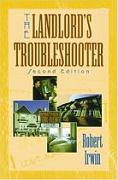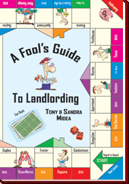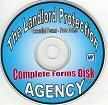
 |
 |
 |
 |
 |
LPA Landlord Newsletter Issue #26 - Landlord-Tenant Rules |
|
|
The LPA Newsletter, January 2006 Dear Fellow Landlord, Happy New Year! As we leave 2005 in the past, many of us would like to stick to or make some new landlord protection resolutions for 2006. I know I do. I hope you enjoy our first newsletter of 2006! This month in The LPA Newsletter, we have:
Please e-mail us if you have any questions or would like to add or share any material / information. Again, we wish you happiness and successful landlording throughout this holiday season!  LANDLORD SPECIAL REPORT:
Learn the Landlord-Tenant Rules!by Attorney William Bronchick, Legalwiz.comAs an investor working with tenants, you should be very familiar with the laws of your business. These laws apply whether you own a property and rent it, or you do a "sandwich" lease. An eviction proceeding, usually called a "summary proceeding" or "unlawful detainer" proceeding, is a lawsuit to obtain a court order to remove the tenant. It is not lawful to physically or constructively remove the tenant from the premises. No matter how upset you are, don't even consider changing the locks, shutting off the power or taking the front door out for "repairs." Before you can commence the proceeding, you need to terminate the tenancy. You do this by serving notice on the tenant as required by your state law. For nonpayment of rent, the notice is typically three to five days. If the tenant has not paid the rent in full or moved out after that time, you can commence proceedings in court. A typical summary proceeding takes anywhere from ten to thirty days, depending on the backlog of cases in your County. The proceeding is informal, much like small claims court. Once the court declares you the winner (called a judgment or order), a warrant (called a "writ" in some states) is issued. A warrant is a legal document that directs a sheriff, marshal, constable or other local official to forcibly remove the tenant from the premises. Few tenants are actually thrown out; the official usually changes the locks and removes the tenant's personal property. In some counties, you are required to hire the movers and store the tenant's property. I recommend that you learn the landlord-tenant laws and the timetable for evictions in your county. However, I also recommend that you hire an attorney to file the court proceeding. Landlord-tenant law is not difficult to understand, but it is very technical. A minor flaw in your paperwork or procedure could mean having your case thrown out and having to start all over. Thus you should consider paying an experienced landlord-tenant attorney to do the job (make sure it is an attorney that specializes in landlord-tenant practice). Lastly, join a local landlord's association and meet other experienced landlords. If you are not familiar with the law, you will eventually run across a "professional" tenant who will teach it to you. CONSIDER BRIBING THE TENANT TO LEAVETime is money when it comes to evictions. The longer the defaulting tenant stays in possession, the more money you lose. Consider waiving the rent owed and offering the tenant cash to leave immediately. This may seem contradictory to the "tough landlord" attitude, but it makes financial sense. Court is the last place you want to be. If you can settle the matter quickly without litigation, do it! Do not pay any money to the tenant until he vacates, cleans the unit, hands you the keys and signs a written release of liability against you (called "general release"). RECONCILE THE SECURITY DEPOSITWhether the tenant leaves voluntarily or by legal force, you need to deal with the security deposit. Whether or not you are entitled to keep the deposit, you must comply with state law. In most states you must return the security deposit within 30 days or send a certified letter to the tenant stating why you are keeping it. Even if you are entitled to keep the deposit, your failure to comply with proper procedure will result in a lawsuit against you for improper withholding. You can always sue the tenant in small claims court for rent owed and damages to the property, but you cannot withhold the security deposit without following the rules. COMPLY WITH STATE & FEDERAL DISCLOSURE LAWSA minor "detail" that most lease/option gurus forget to mention is that if you sublease a rental unit, you are a landlord. As a landlord, you have state and federal disclosure requirements. At the federal level, you must disclose the existence of lead-based paint hazards and give your tenant an EPA pamphlet (see EPA.gov). State law disclosures vary greatly, from radon gas disclosures to "Megan's" law (disclosure of known sex offenders in your area). Check with your state and county housing authority for the required disclosures. Also, keep in mind that some states might consider a lease/option to be a sale for the purposes of disclosure. Thus, you would need to disclose the same items on a lease/option that you would on a sale.
Landlord Resolutions for 2006: I will
I will
Landlord Tip:Don't Forget to Charge for Damages
It is easier to avoid confrontations with tenants and just let them go away after they've moved out and damaged my rental. I got tired of taking it on the chin and now I charge the tenants for damages. One of the easiest ways to cover myself is to not release any deposit money until after the unit is returned in acceptable condition. I now use a Property Condition Report to document the condition of the unit at the time of "Move In". After totalling up any damage charges, and listing them on a Security Settlement Statement, I send the balance of the deposit to the tenant's forwarding address. - LPA Member Jack Klein
 The 6 Biggest Landlord TrapsEven those who have been around for a long time have fallen into these common landlord traps. 1. Improper Screening"95% of tenant problems can be eliminated in the screening process." Believe it or not, many landlords still are very trusting and comfortable with a basic application if any or a handshake. The eviction courts are full of landlords who like to trust their 'gut' feeling. The Landlord Protection Agency highly recommends you use our rental application or another comparable application. Applications are powerful screening tools when you verify the information that they contain. 2. AdvertisingDo you really have to spend a lot of money? click here for the full article... Quotations...



"Other people's opinion of you does not have to become your reality." - Les Brown "The trick is to make sure you don't die waiting for prosperity to come." - Lee Iacocca "Don't go around saying the world owes you a living. The world owes you nothing. It was here first." - Mark Twain "That consciousness is everything and that all things begin with a thought. That we are responsible for our own fate, we reap what we sow, we get what we give, we pull in what we put out. I know these things for sure." - Madonna A Way of Being
"How much did your last tenant problem cost you?" Robert Irwin is the bestselling author of more than 50 books on real estate. His career in the real estate industry encompasses more than three decades of experience as real estate broker, landlord, and consultant to lenders, agents, and investors.  Books by LPA Members



 LPA Membership Expiring? |
|||||
|


Starting 6/1/07: We're DOUBLING your referral fees so you can earn twice as much!
No more 10% referral fee, it will now be 20%!
 Earn a 10% commission on all
orders placed with The Landlord Protection Agency by customers that you
refer to us!
Earn a 10% commission on all
orders placed with The Landlord Protection Agency by customers that you
refer to us!






Look-up
Associations
Attorneys
Businesses
Rentals Available
Rentals Wanted
Classifieds
Tips & Advice
Realty Brokers
Tenant Histories
Other Areas
Q&A Forum
Landlord Tenant Law
Essential Forms
Free Forms
Credit Reports
About Us
Help
© 2000-2023 The Landlord Protection Agency, Inc.